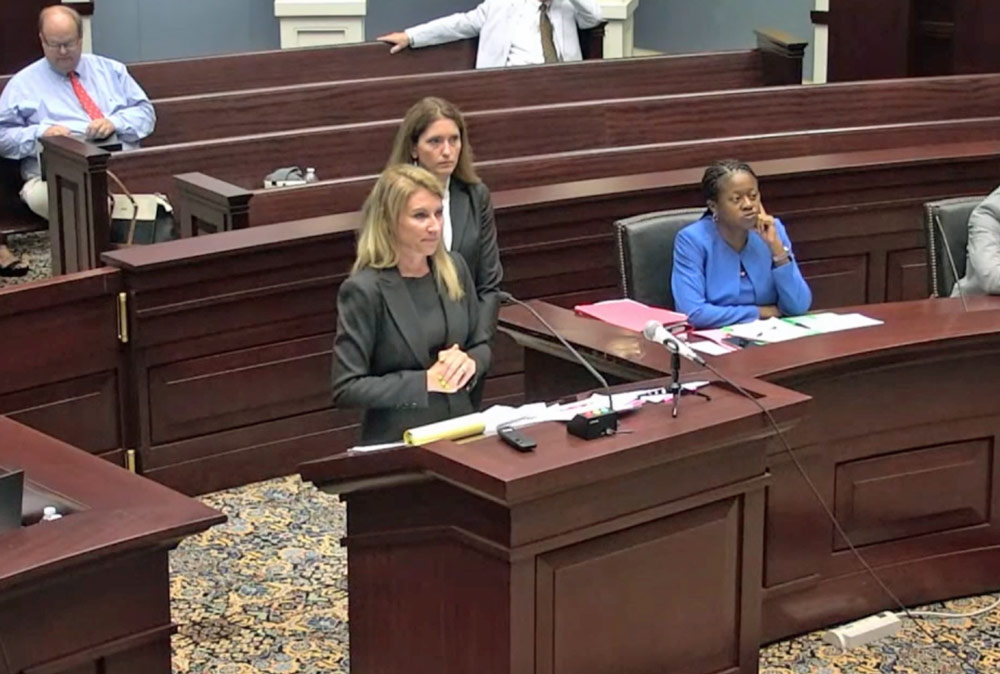In addition to winning her case today before the Florida Ethics Commission, which unanimously supported her, Flagler County School Board member Lauren Ramirez’s challenge to proposed restrictions on her private business prompted the commission to ask the Florida Legislature to amend the pertinent sections of the law to forbid future conflicts of interest restrictions.
With reasons presented to the Ethics Commission by her lawyer, Theresa Pontieri, the vice mayor of the Palm Coast City Council, Ramirez almost won her challenge.
Both of them attended an 80-minute session before the Commission in Tallahassee. The commission staff attorneys were instructed to revise the proposed opinion they had presented by a unanimous vote. They will need to produce two different opinions: one that reverses the results that Ramirez had contested, and the other that upholds the findings that she was not contesting.
The commission was troubled, according to one commissioner, by the scope of the original proposal and the potential deterrent effect it might have on businesspeople who choose to run for office. This is reflected in the second opinion, which will go further in Ramirez’s favor than even she had requested.
“If we take the opinion as it is, there’s a lot here that has some really, really big impact,” Commissioner Jeremy Rodgers stated. Depending on how far you take that, it may become extremely restricting for anyone performing any kind of public duty, in my opinion.
Last November, Ramirez won a seat on the school board. Salus Medical Training, which she founded and runs, provides CPR instruction, medical camps, phlebotomy certificates, babysitter certifications, and other related courses. There are nine courses available for adults and four for children. Seventy percent of her clients are adults. Ninety percent are from out of the county, and fifty-nine percent of the thirty percent who are students are enrolled in babysitting certification programs.
Last year, Ramirez’s business made over $50,000 from its contract as a vendor for the Flagler County school district. She sponsored a Future Problem Solvers team and promoted her business in schools by volunteering and wearing apparel imprinted with her company’s brand.
She stopped much of that when Ramirez started running for the board. Without the promotion, she kept volunteering. She terminated the district’s contract with her. She asked for an ethics opinion on her responsibilities as Salus Medical’s owner and board member a few months after she was elected. She wanted to address any potential conflicts of interest just to be sure. Such advisory opinions are made available by the Ethics Commission, which encourages officials to utilize them.
Four queries were posed by her.A proposed opinion addressing all four was written by Stephanie Elona Novenario, a Florida Commission on Ethics staff attorney. According to the suggested ruling, Ramirez might keep volunteering at schools as long as she or her staff didn’t promote her business. She was not allowed to establish a contract with the district or promote or solicit pupils using the district’s electronic portal. None of those conclusions bothered Ramirez.
However, the proposed opinion went on to say that Ramirez’s company was not allowed to offer any of its courses to any students in the Flagler County school district, either as paid employees or as volunteers, according to current law, or at least the commission attorney’s interpretation of the law.
According to Novenario, there is nothing intrinsically wrong with a school board member managing a private company. Additionally, a school board member volunteering in her district’s schools is not intrinsically immoral. However, there are some facts and situations that, when combined, could result in a conflict of interest that is forbidden under the code of ethics if a school board member who owns a private company volunteers in her district schools on behalf of that company. This conflict of interest is the result of a combination of the facts and circumstances.
Regarding the employment of district workers, Ramirez was prepared to make concessions. However, she believed that district children were unfairly restricted. The commission concurred.Are kids prohibited from dining at a restaurant owned by a member of the school board? Ashley Lukis, a lawyer from Tallahassee, who chairs the commission, inquired.
Additionally, the commission believed that the sponsorship and employment restrictions were needless and unduly broad.
I can appreciate the viewpoint. It bothers me. According to Tampa lawyer Commissioner Paul Baine, it’s confusing. I would resign from my position as a school board volunteer in order to keep running my company. She isn’t even aiming to complete tutorial tasks to fulfill school requirements, really. This is medical education. It is not related to any of the school’s academic requirements. Therefore, the application is bothering me.
Baine was talking about how the ethics law was applied by the commission counsel. He went on, “I’m not saying that your application is illogical in any way.” I simply dislike the practical impact of it, and it appears to deter many who could serve as school board members from volunteering in a meaningful way.
As the majority of the commission members talked before she reached the lectern, Pontieri sensed their uneasiness. Citing each commissioner by name, she spoke to their remarks one at a time.
Ramirez has no contact with enrolled students, according to Pontieri. Beyond that, however, she pointed out a weakness in the logic of one of the scenarios in the proposed opinion: a teacher cannot charge a student for tutoring if the student is enrolled in the teacher’s class. However, the instructor is free to tutor any other pupil. According to the proposed opinion, Ramirez has jurisdiction over all students.
According to Pontieri, a teacher can exercise authority over a student even if they are not enrolled in their class. The teacher can exert some authority and influence over the student just because they are enrolled in that school and may be providing some sort of supervision. Therefore, it would be overly broad to claim that none of these students can enroll in Ms. Ramirez’s classes that are wholly unconnected to the curriculum because, in theory, she oversees the entire district. According to the Commission, we are going too far, which would severely limit the number of persons who are willing to serve on boards other than school boards. To be honest, commissioners, I am the vice mayor and a member of the Palm Coast municipal council. In addition to having private companies that allow them to make a living and put food on the table, it would prevent many public officials from serving in some manner.
Pontieri provided commissioners with precedent-based legal support to support their disapproval of the proposed opinion, if not the law as it stands.
It was clear even as Pontieri continued to marshal arguments in Ramirez s favor that the commissioners, already bothered by the proposed opinion, were ready to go further than just amend it or accept it in part, as they could have done.
“I do believe that the statute itself is troubling and that we should really go back to the legislature and try to make the statute a little clearer than what it is today,” Commissioner Linda Stewart stated. “We may be able to do a better job if we adjust the statute itself because we’re going to be seeing these things, possibly, over and over again, case by case.”
The opinion casts a wide net, and we need to take a scalpel approach, Commissioner Jon Philipson said. Like Commissioner Stewart, I think there may be a legislative solution. But adopting this opinion would have a floodgate effect, and I think would inhibit people from wanting to do public service.
The commission moved to have the whole proposed opinion scrapped and rewritten in two separate opinions, though Steven Zuilkowski, the deputy executive director of the commission and its general counsel, was a bit exasperated at not getting the clearest direction on all the questions. It s still not clear for example, where the commission stands on a board member s company logo appearing on students club shirts, or whether a board member may hire school district employees for his or her business, at least not by consensus. It appeared that the commission was willing to allow both.
The opinions will be submitted to the commission at a future meeting for review, leaving the matter technically pending for now.







